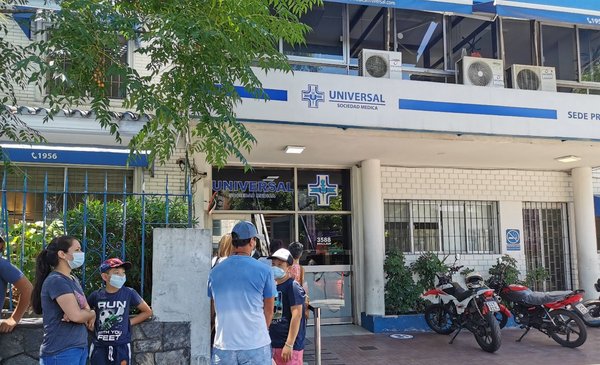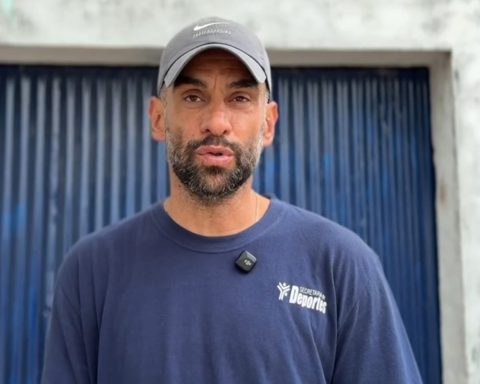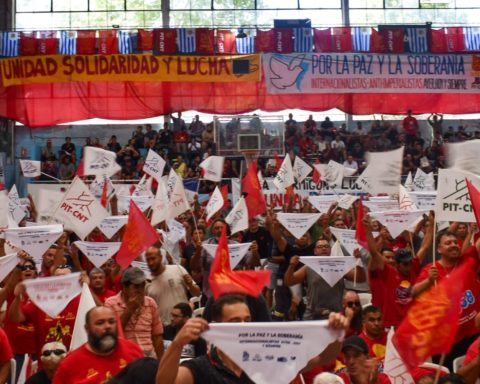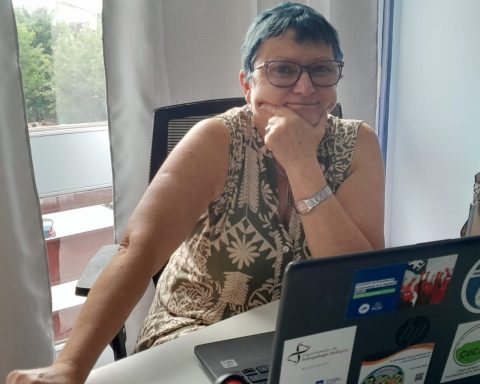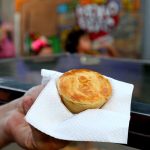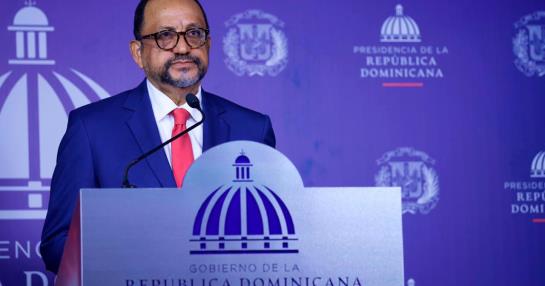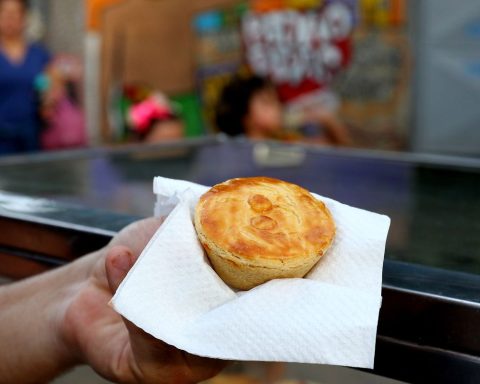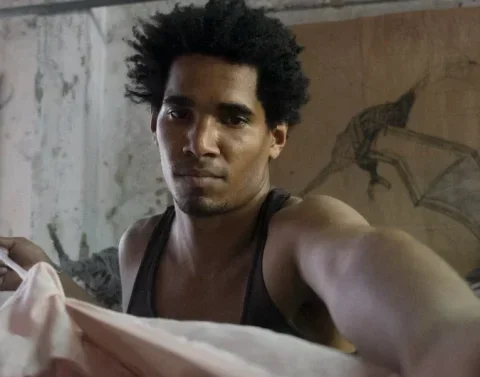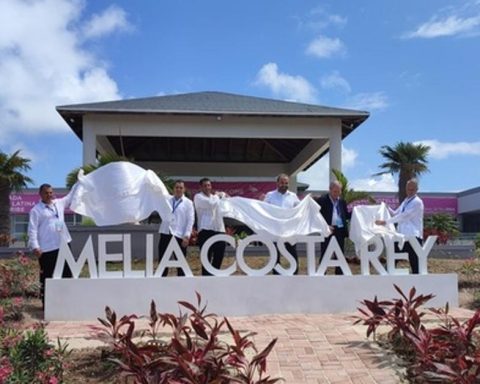When the official of the vaccination center located in the Universal Medical Society on Millán Avenue approached to inoculate her daughter this Wednesday, Lorena Piñón asked: “It’s Pfizer, isn’t it?”. His nervous question came from the fact that some 24 hours before, in that same place, 158 children had been vaccinated with Sinovac by mistake.
The problem was noticed by a vaccinator around 2:00 p.m. on Tuesday, when she took up her work shift and realized that the doses administered were not those of the American laboratory, but the news was known on the night with a statement released by the Ministry of Public Health (MSP). According to the ministry, those affected received one-fifth of an adult dose of Coronavac instead of Pfizer’s pediatric inoculation.
Despite the information, Piñón and her husband Nicolás Martínez did not hesitate, and their daughter was vaccinated anyway. However, the mother acknowledged that in the line of about ten or 15 meters that was observed at noon on Wednesday at the polyclinic, the dialogue was. “Did you see the news?” or “how could something like this happen?” were some of the triggers of the exchanges that Piñón had with other parents in the place, according to what he told The Observer.
At the behest of this situation, the MSP formed a technical team that the relatives of the affected children are being contacted to inform them of the situation and give them good and bad news: the first is that “no consequences expected” or “side effects” in terms of health, and the second is that “The vaccine does not work nor will it generate any type of defenses”, as explained this Wednesday by the pediatrician who is a member of the MSP’s Immunization Unit, Gabriel Peluffo.
The reason for the uselessness of the injection has to do with the small dose administered in minors. Children receive a third of an adult dose from Pfizer, and as explained by the MSP, the liquid for ten injections is extracted from a single vial of the vaccine. In the Sinovac vial, meanwhile, doses for two patients are drawn.
In this sense, as the vaccinators used the tenth part of the Chinese vaccine thinking that they were injecting the one from the American laboratory, what they actually inoculated was a volumen Five times smaller than a typical Coronavac.
The causes of the error are still unclear and are being investigated by the authorities, who ordered the Legal Division of the MSP to analyze the situation in conjunction with the Honorary Commission for the Fight against Tuberculosis and Prevalent Diseases (Chlaep), in charge of managing of vaccination centers.
However, as it turned out, there was a carryover of Sinovac vaccines for the adult population that were applied to children as a result of a “confusion”.
Peluffo explained to the press that there are patients who continue to be inoculated with the Chinese laboratory “especially for medical indications” because they “require” this vaccine, but he clarified that due to the mistake made, a “reordering of the process” by which it was decided to withdraw all the remaining doses of Sinovac from that and the rest of the country’s vaccination centers. That process began this Wednesday and, if necessary, a special place will be assigned later to administer the Sinovac doses, Peluffo said.
As a consequence of the error, moreover, the Health Minister himself, Daniel Salinas, decided that the three officials involved in the case were removed from office. as he knew The Observer, the vaccinators had been hired by the MSP and had no connection with the Universal Medical Society, which on Wednesday issued a statement disclaiming responsibility for the event and stated that the mutualist had only provided the location for the inoculations. The renewal of members in Chlaep was also resolved.
The vaccination day at the polyclinic was “absolutely average” this Wednesday. An official of the mutual society explained to The Observer that the rhythm of inoculations did not vary with respect to other days in that place, although he did recognize some “resentment” and “insecurity” in some families. “People ask and doubts have to be cleared up,” he said. Piñon added that at the place they told him that “he had the right to ask” and said that one of the officials who were attending told him that he actually worked at the Antel Arena, but that as a result of the situation he was asked to go to that vaccination.
The expectation in the MSP, however, is that this case does not impact adherence to vaccination of minors. Peluffo pointed out that although “it could have an influence”, it is necessary “reaffirm” the need for minors to be inoculated against the coronavirus. “Children are considered for their individual safety as liable to be vaccinated and that is what we are going to continue promoting,” said the pediatrician.
In addition, he reported that according to the data handled by the MSP, between the number of scheduled minors and effectively inoculated children, 50% of the target population has already been exceeded. The expert stressed that “there is a good response” from the population and also from the vaccine, of which “there are no adverse effects to report.”
“no effect”
Some technicians consulted by The Observer coincided with the official position of the MSP that in health terms there will be no consequences for children who received the dose of Sinovac by mistake.
The infectologist and pediatrician Álvaro Galiana made it clear that although it is “a situation that does not correspond”, there is “no reason” in principle to expect adverse events in affected minors. “It has no effect nor will it generate anything harmful”Galiana considered, who stressed that Coronavac “is a good vaccine.”
However, the immunization received is also not expected to mean anything in terms of protection against the covid-19 virus: “They received a puncture that is not going to help them at all”, said the pediatrician in dialogue with The Observer.
In addition, the immunologist Álvaro Díaz explained that the Sinovac vaccine is based “on a traditional technology that has been in use for decades”, which consists of the introduction of the inactivated virus, and that due to the characteristics of its formulation it is expected that there will be no “no surprise”. “The possibility of adverse effects is remote”, considered the expert.
The Chilean case
Several countries have ordered the vaccination of minors with doses from the Sinovac laboratory and one of the cases is chili, which began inoculating children between six and eleven years old in September of last year and was a pioneer in the injection against covid-19 in this age group. In November, the health authorities expanded the target population and also included children aged three and older as likely to receive the doses from the Chinese laboratory.
The Chilean case was praised by Galiana as “a very good experience” and said that in general, in a full dose applied in minors, no problems or adverse events of great relevance were reported in the trans-Andean country. “There is not much mystery”, considered the pediatrician.
In the press conference led by Peluffo in the afternoon, the example of Chile was also mentioned to convey reassurance about possible negative effects on the 158 children vaccinated by mistake. The pediatrician told the media that the dose from the Chinese laboratory “has a good safety profile”, something that had also been outlined by the MSP in Tuesday’s statement.
“It should be noted that this vaccine platform, although it is not administered in our country to the population under 15 years of age, is being implemented in several other countries in the region and the world, in its original dose for several months, without have reported serious side effects”, explained the portfolio in its communication.
In the region, Ecuador has also used Sinovac to vaccinate minors. Argentina opted for Sinopharm, which according to Galiana is “very similar” to the Chinese laboratory due to its composition. In none of these cases were there serious side effects.
